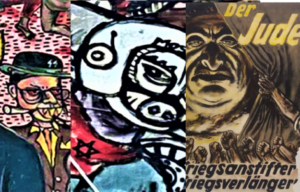Indonesian artists claimed people “misunderstood” a piece that portrays an Israeli as a pig and includes an image of a man in a black hat and sidelocks with fangs, red eyes, and an SS insignia.
By United with Israel Staff
While the curators of a major German art show (Documenta Fifteen) apologized for displaying an antisemitic piece that led to international outcry, the work’s creators denied their work promoted Jew-hatred.
Taring Padi, the Indonesian collective responsible for the piece, claimed the 20-year-old piece was “in no way related” to antisemitism and referenced Indonesia’s post-1965 dictatorship, reported the Associated Press.
Days earlier, Documenta organizers ordered the piece (“People’s Justice”) to be taken down in response to criticism from Jewish groups in Germany, a nation where Jews survived state-sponsored genocide during World War II.
The Taring Padi mural depicts a man with a black hat and sidelocks, which are traditionally worn by Orthodox Jews, in addition to fangs, red eyes, and an SS insignia, the latter of which is reminiscent of the false antisemitic trope that Israelis treat Palestinians like the Nazis treated Jews during the Holocaust.

Art in depicting a Nazi insignia (L) and a pig with the Star of David (C) (Screenshot/Twitter); Nazi propaganda (R) (Shutterstock)
The work also includes an image, ostensibly of an Israeli, with a helmet bearing the words “Mossad,” the Jewish state’s national intelligence agency. The character is depicted as a pig.
The images are reminiscent of Nazi propaganda, which sought to dehumanize Jews and portrayed them as animal-like creatures deserving of extermination. Such propaganda was a key feature of Adolf Hitler’s genocidal campaign to destroy the Jewish people.
“We are sorry that details of this banner are misunderstood other than their original purpose. We apologize for the injuries caused in this context,” said Taring Padi in response to the controversy.
“[I]n a statement posted on the show’s website late Thursday, fellow Indonesian art collective Ruangrupa, which curated the exhibition, said curators had ‘collectively failed to spot the figure in the work, which is a character that evokes classical stereotypes of antisemitism,'” AP reported.
“We acknowledge that this was our error,” Ruangrupa added.
“We apologize for the disappointment, shame, frustration, betrayal, and shock this stereotype has caused the viewers and the whole team who has worked hard alongside us to make documenta fifteen a reality,” the group said.
“This imagery, as we now fully understand, connects seamlessly to the most horrific episode of German history in which Jewish people were targeted and murdered on an unprecedented scale,” Ruangrupa said.
Prior to the statement, the Israeli embassy in Germany called the Taring Padi piece “Goebbels-style propaganda,” referencing Joseph Goebbels, who engineered the Nazis’ antisemitic messaging during the Holocaust.
The Taring Padi controversy was proceeded by previous accusations of antisemitism leveled at Documenta for its inclusion of a Palestinian collective called the Question of Funding, which was linked to the antisemitic BDS movement by the Alliance Against Anti-Semitism Kassel.
The German parliament deemed BDS antisemitic in 2019 and banned it from receiving federal funds. Half of Documenta’s $44 million comes from such funds, according to AFP.
